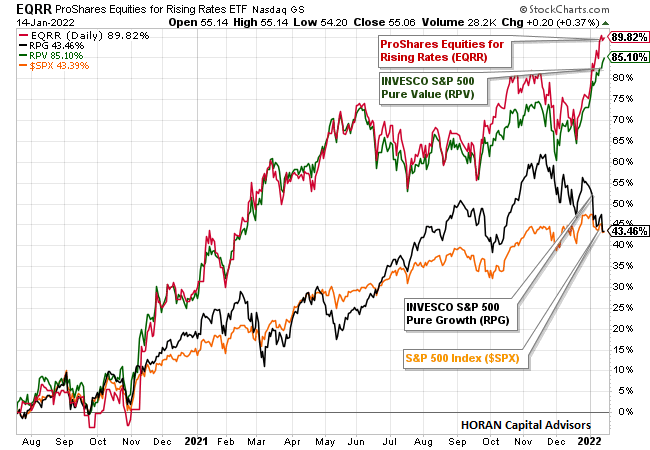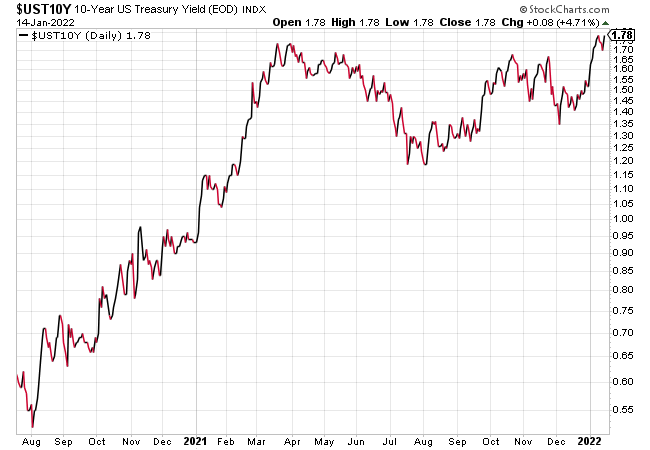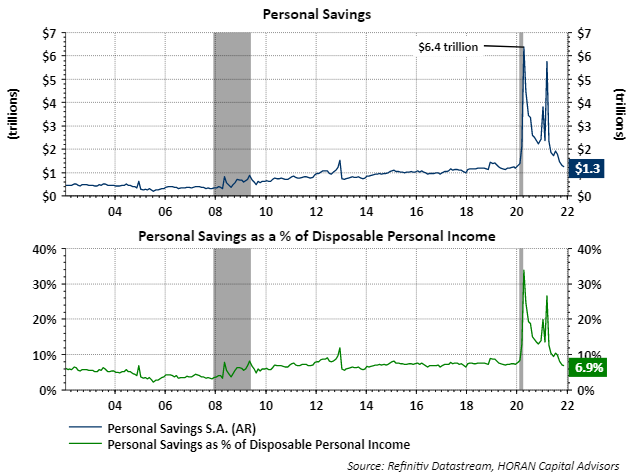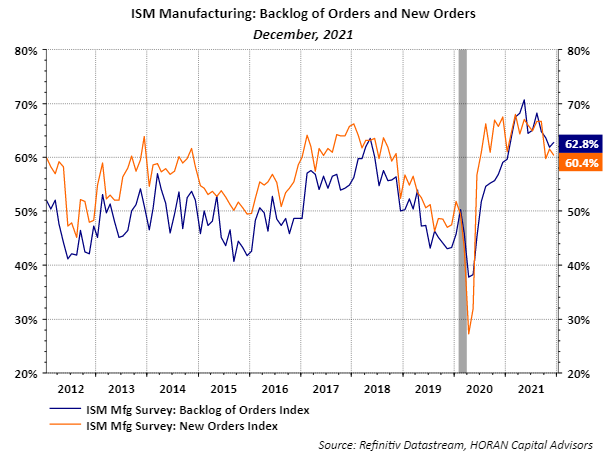Author: David I. Templeton, CFA, Principal and Portfolio Manager
The recent release of Federal Reserve minutes gave investors a reason to reevaluate the pace of future Fed tightening. The minutes lead investors to believe the Fed might raise rates in the first half of this year and maybe as soon as March and the January 25-26 Fed meeting likely sheds more light on future rate hikes. Quantitative Tightening (QT), or the reduction in the Fed's balance sheet, may occur soon after rates move higher too. This earlier increase in rates comes on the back of higher inflationary pressures and and what seems like a tight labor market.
This move higher in inflation has led to better performance in stocks that would benefit from higher inflation. The ProShares Equities for Rising Rates ETF (EQRR) has performed as expected in this higher interest rate environment. Investors should know though, this ETF is concentrated in mostly five sectors. As of the end of November, 2021, the three largest sectors, Financials, Energy and Materials, account for almost 80% of the weighting in the ETF. As the below chart shows, since mid-July of 2020 the EQRR index has outperformed the S&P 500 Index, 89.82% versus 43.39%. Has the performance of this index already discounted those equities benefits from an inflationary spike? Also evident on the chart is Pure Value's outperformance relative to Pure Growth's, 85.10% versus 43.46%.
The favorable performance for stocks that benefit from higher interest rates has taken place at about the same time market interest rates have actually moved higher. Over this same time period the yield on the 10-Year U.S. Treasury has increased from about .50% to 1.78% as seen below. The higher move in market interest rates has pressured bond or fixed income returns.
Higher prices, pressure on "real" wages and already satisfied pent up demand may be an indicator of a lessening of inflationary pressure. As Nancy Lazar of Cornerstone Macro recently noted, "Real retail sales -- units -- have been declining for almost a year, as pulled-forward demand dissipates. Basically, consumers bought 3-years worth of stuff in a year (e.g., computers, TVs, household appliances, sports equipment, etc.), and with the pandemic transitioning to an endemic, consumers are shifting from spending on stuff to spending on services, just as income slows sharply, back to trend. Indeed, investors are anticipating this, as reflected in hotel stocks recently outperforming."
This pull forward in demand/elevated spending can be seen in the decline in the build up in savings. Personal savings rose to $6.4 trillion at the peak of the pandemic and is now back to a more normal $1.3 trillion.
As desired by the Fed, interest rates are most likely moving higher and off the near zero level in place today. And fiscal and monetary stimulus needs to be reigned in, but the question remains how strong is the economy and will higher rates tip the economy into recession. We believe economic growth is not red hot and the satisfying of pent up demand resulting from the pandemic shut down is slowing. Economic growth likely moderates as the year progresses with near term volatility due to uncertainty that is generally associated with midterm election years and the Fed's move higher in interest rates. On balance businesses continue to see favorable business prospects. The below chart shows the ISM Manufacturing Indices for backlog of orders and new orders. Both are at high levels but coming down to more historical levels. At the end of the day, we believe inflationary pressure subsides from its current high level.
HORAN Wealth, LLC is an SEC registered investment advisor. The information herein has been obtained from sources believed to be reliable, but we cannot assure its accuracy or completeness. Neither the information nor any opinion expressed constitutes a solicitation for the purchase or sale of any security. Any reference to past performance is not to be implied or construed as a guarantee of future results. Market conditions can vary widely over time and there is always the potential of losing money when investing in securities. HORAN Wealth and its affiliates do not provide tax, legal or accounting advice. This material has been prepared for informational purposes only, and is not intended to provide, and should not be relied on for tax, legal or accounting advice. You should consult your own tax, legal and accounting advisors before engaging in any transaction. For further information about HORAN Wealth, LLC, please see our Client Relationship Summary at adviserinfo.sec.gov/firm/summary/333974.





